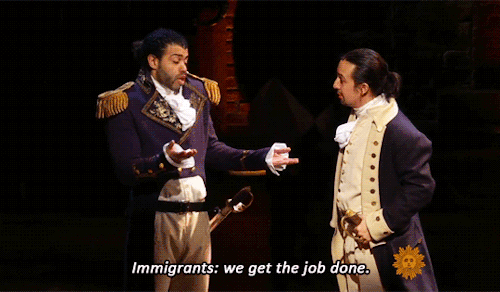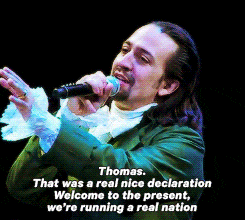Last week, it was announced that Harriet Tubman would replace Andrew Jackson on the $20 bill. While America celebrated the inclusion of such an important female historical figure on our money, fans of the Broadway hit "Hamilton" rejoiced in double measure, as there has been talk that it would be the “ten-dollar founding father” who Tubman would be replacing. However, Alexander Hamilton gets to stay on the bill, a decision undoubtedly influenced by Lin-Manuel Miranda’s smash hit hip hop musical.
Earlier in the same week, Lin-Manuel Miranda received a Pulitzer Prize for "Hamilton," one of only nine that were given to plays in the last hundred years. Previous winners include "Rent," "A Chorus Line," and "South Pacific," all of which were politically proactive, which puts "Hamilton" in good company. Its cast is comprised of mostly people of color—black and Hispanic founding fathers—is just as revolutionary as the events of the plot.
The winning of the Pulitzer prompted the consideration of raising the prices of tickets to the show, which is significant because premium tickets are already at $595 a piece. Yet people still fill up the Richard Rodgers Theater every night to be in “the room where it happens.”
So, what is the big deal? How did a musical about Alexander Hamilton and rapping founding fathers influence the decisions of the United States Secretary of Treasury, win such an exclusive and prestigious award, sell out an entire summer’s worth of shows by March, and manage to captivate the country more than any Broadway show has ever done?
Here are four things about the show that prove just how important Hamilton is:
1. Diversity
The show's most defining feature is that nearly every founding father is portrayed by a black actor. Lin-Manuel Miranda claims POC actors were chosen because they are the best choice to perform the genres of music selected for the show: rap and hip hop. Also, having black founding fathers claims the story of America's past for America today.
Throughout the show, positive light is also shed on immigrants. The opening line characterizes Alexander as a "bastard, orphan, son of a whore and a Scotsman, dropped in the middle of a forgotten spot in the Caribbean" who "grew up to be a hero and a scholar." At 19, he traveled as an immigrant to the United States where he was able to "rise up" and become a founding father of our nation—a poster boy for the American Dream. In a world where there's so much talk against immigrants, it's a nice reminder that one of the founding fathers was one.
2. Feminism
"We hold these truths to be self-evident, that all men are created equal. And when I meet Thomas Jefferson, I'm 'a compel him to include women in the sequel." (The Schuyler Sisters)
"Hamilton" is full of feminism. Though we typically don't hear as much about women in colonial times as we do about the founding fathers in history classes, the show tells the stories of Angelica, Alexander's wife Eliza, and Peggy Schuyler as if they're just as important--because they are.
Women get the leads in some of the most powerful songs in the show--including but not limited to "Satisfied," "Burn," and "Who Lives, Who Dies, Who Tells Your Story." Women are respected and considered equals to the men in the show.
3. Hip Hoppin' Politics
"A civics lesson from a slaver. Hey neighbor, your debts are paid 'cause you don't pay for labor!" (Cabinet Battle #1)
Imagine this: all future presidential debates and congressional meetings are rap battles. Amazing, right? The two cabinet meetings in "Hamilton" are staged as rap battles between Hamilton and his political nemesis and fellow founding father Thomas Jefferson, and they're so fun because of the witty rhymes and digs they take at each other. These songs and others, including "The Room Where It Happens," "Washington On Your Side," and "The Election of 1800," poke fun at the pettiness of the politics of the beginning of our country and now, in how closely the founding fathers' drama resembles today's. Also, the clever lyrics and catchy beats make you care about and learn American history without even realizing you're doing it. And the best part is you enjoy every minute of it.
4. Who Lives, Who Dies, Who Tells Your Story
"Let me tell you what I wish I'd known when I was young and dreamed of glory: you have no control who lives, who dies, who tells your story." (History Has Its Eyes On You)
A recurrent theme in the show is the idea of a legacy. The show is narrated by Aaron Burr, who infamously killed Alexander Hamilton in a duel, playing on the idea that the victor gets to tell the story. Alexander acts as his own narrator in a way because of the way he aggressively protects his good name and tries to shape the way future generations remember him, which is ironic considering in the opening number, Aaron Burr claims "his enemies destroyed his rep, America forgot him." Lin-Manuel Miranda also acts as a kind of narrator of the story because he wrote the show.
So, there's a question: who tells the story? The show answers on many levels, but it all boils down to one answer: we do. The whole show is proof we don't have to accept what is. We can have black actors portray founding fathers. We can remember the story from Burr's point of view or from Hamilton's. We can listen to a story so seemingly distant from our world today and claim it like it's our own. History may have its eyes on you, but it's not set in stone.
The big deal about "Hamilton" is that it tells a story lost in history of an immigrant turned founding father, and it reclaims the story of the beginning of America for today's America. It's no wonder this show full of diverse actors, strong female characters, Grammy award-winning songs, and important themes has turned the world upside down.
So, if you haven't listened to the cast album, what are you waiting for?

























